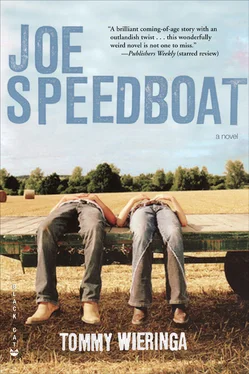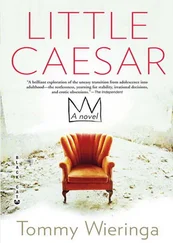As I said earlier, Engel was one of those people you might not notice for years on end, until suddenly you saw him with a kind of light all around. That’s how it was with Engel and the fairer sex as well. He never took part in the games of kissing tag, never passed love letters in class. Instead he drew aerodynamic wonders in his hardcover notebook, and made casual discoveries that would have knocked the world for a loop if only he hadn’t forgotten them right away. One day Heleen van Paridon and Janna Griffioen both fell in love with him. For no apparent reason. That same week they were joined by Harriët Galama (breasts) and Ineke de Boer (even bigger breasts). After that, things took off. Former cavaliers lost both their lustre and the struggle for attention, two or three other girls also fell in love with Engel, and so, out of the blue and without having done a thing to earn it, he became the uncontested blue-ribbon stud of the schoolyard. His pockets bulged with folded scraps of paper on which shaky fingers had embossed red hearts.
To me Engel seemed as clear and spontaneous as water. Musashi, in his essay on ‘Water’ in Go Rin No Sho , once said something about that: ‘With water as its basis, the spirit becomes like water. Water assumes the shape of the vessel; sometimes it is flowing, sometimes it is like a roaring sea.’
And Engel was, I have to admit, stupendous in his new role as Casanova. He dealt out tokens of attention with a light hand, conjured up shy smiles on their faces, but it interested him too little to really do much about it.
Like Joe, he had become fascinated early on by natural scientific phenomena. At home one day, having opened the medicine cabinet in the bathroom too brusquely, a bottle of mouthwash, a strip of vitamin pills and an old toothbrush fell to the floor; though up to his knees in an explosion of glass and glycerine, Engel noticed that the bottle, the strip and the toothbrush all hit the tiles at the same moment, despite their differing weights.
‘Newton,’ was all Joe said when Engel told him of his discovery.
‘Oh,’ Engel said, ‘too bad. I really thought. .’
‘Listen, forget Newton. The guy wore a wig. Goodyear’s our man.’
No one knew what he was talking about.
‘Charles Goodyear,’ Joe said, ‘was the first person to vulcanize rubber. It was a revolution. Copernicus made the world round, Goodyear made it drivable. Back then rubber was a real problem, it got too soft when it was hot and hard as a rock when it was cold. There wasn’t much they could do with it, but Goodyear was nuts about it, about the idea of rubber. He experimented for years but couldn’t get it right. Until one day he mixed sulphur with the rubber and accidentally spilled some on a hot stove. Then it happened: it got hard, it vulcanized. That’s what they’d all been waiting for, that was the start of the whole thing, after that rubber made the world go round. On rubber tyres! But it didn’t do Goodyear much good, he couldn’t even defend his patent. He died without a penny. Martyrs, that’s what they are, they give their lives for a cause.’
That made us feel sad and a little quiet, the same way you feel when you hear about jazz musicians whose playing was out of this world but who never got a cent from royalties. You wished it could have been their own stupid fault, just so you wouldn’t have to feel like that.
On those afternoons, when they were all sitting around back in Joe’s garage, India would roll me out to them. India was good to me. Ever since the day I came by to ask Joe help me get Sam down out of the tree, she seemed to have developed a fondness for me. When I would come down Achterom on one of those vacant afternoons and see their bikes standing out in front, I’d pound on the door with the flat of my hand till she opened up. She’d roll me out back with a kind of breezy helpfulness and park me in between Joe, Christof and Engel. The garage was always full. There was only one chair, for Engel. In any case, he was the only one I ever saw sit in it. He probably wanted to keep his duds clean; I never met anyone else who wore tailored suits at the age of sixteen. Joe would sit on the workbench, Christof on the engine block. That garage was the smithy of their plans. In that smoke-brown shack that smelled of welding rods and burnt oil they dismantled the world, in order to put it back together as they saw fit.
‘But rubber tyres won’t do you much good if the roads are rotten,’ Joe said. ‘You need roads: asphalt roads, not the kind of sandy paths and broken stone they had back then. Those were bad for cars, and everyone you passed choked on your dust. Which brings us to Rimini and Girardeau.’
Joe looked at Christof, who was twiddling his fingers absent-mindedly.
‘It’s also the story behind Bethlehem Asphalt, Christof. Your people owe it all to them. The engineers, ah yes!’
He made a clacking sound with his tongue. Engel nodded to him to go on.
‘It was easy as pie, really. Rimini and Girardeau came up with the idea of taking all the rocks out of the road and filling the potholes. After a steamroller smoothed the whole thing out, men with huge watering cans would sprinkle boiling tar all over the road. A thin layer of sand over that, let it dry for a couple of days, and you have the first highway.’
‘You forgot the internal combustion engine,’ Christof said. ‘That seems more important to me than rubber and roads.’
‘Ooof,’ Joe said, as though someone had punched him in the stomach. ‘That’s a different story altogether. Horse and wagon, steam turbine, internal combustion engine. Here’s how I see it: you’ve got four elements, OK? That’s what man had to tame: fire, water, earth and air. .’
That caught my attention right away: those were also the names of the first four chapters of Musashi’s book: ‘Earth’, ‘Water’, ‘Fire’ and ‘Wind’. (The last chapter consists of only one page: ‘The Void’.)
‘Fire is the first element,’ Joe said. ‘Fire brought light into the darkness of prehistory.’
He waved his hand over his shoulder, as though prehistory were back behind the hardboard dividing wall with the shapes of tools outlined on it in marking pen, the way traffic and murder victims are outlined in chalk. You never saw the tools themselves hanging there; in the workshop behind Joe’s house, the tools went their own way.
‘Then you’ve got fire, which is the start of civilization. After that comes water, important for farmers, water is. Irrigation means greater productivity and prosperity for many. Then earth: soil for the farmer, roads for the merchant. From the road comes the wheel. The merchant and the soldier are the ones who profit most by the wheel, and each wheel is a little cog in the big gearbox of the Earth. After a manner of speaking. Together, the two things form a mechanism. The wheel leads to the combustion engine, which goes along with the wheel. The combustion engine sets the wheel in motion, the wheel makes the world go round. That’s three.’
I thought about my own form of propulsion, which I owed to wheel, rubber and asphalt. I, half man, half vehicle, saw myself for a moment as a tiny link in Joe’s view of world history; my wheels rolled across the surface of the earth and contributed to making the world go round.
‘OK,’ Joe said. ‘So air was the final element they had to force their way into.’ The airplane was the crowbar they needed. In the late nineteenth century, the first person to really fly was an engineer too: Otto Lilienthal. He just kept picking himself up and dusting himself off, until finally he flew with a pair of wings on his back that he’d copied from the birds. That was the mistake they all made, every single person who tried to fly; imitating the birds is ridiculous of course — in proportion to its body, a bird’s wing muscles are so huge that you could never reproduce that with your arms, no matter how strong you were. That mistake in their thinking kept people on the ground much longer than necessary. But Otto flew fifteen metres, which is incredible! Within a couple of years the first zeppelin was floating in the sky, silent and beautiful, but also a flying bomb. No, the real potential lay in the marriage of the combustion engine with a pair of wings. The first time the two kissed was in America, when one of the Wright Brothers flew thirty-six metres: more than twice as far as Lilienthal — a revolution of twenty-one metres! After that it was wide open; aviators started popping up everywhere, breaking one record after another. A one-kilometre flight above Paris — world news! Crossing the Channel in a monoplane — England went bonkers. Anthony Fokker flying above Haarlem — the end of days!
Читать дальше












